Navigating the history of racism through literature
This isn’t a war between black and white; it’s an ongoing battle between racism and justice.
As an NBPoC (non-black person of colour), I will never be able to fully understand the black experience and the specific forms of anti-black racism my black friends endure every day. And it is for this reason I was hesitant to write about this subject, especially during a time in which black voices must take centre-stage after being side-lined for too long. As a writer I have a duty to use my voice, and the greatest lessons I’ve learnt have been from the teachings of black writers.
When history is so whitewashed, and when the realities of anti-blackness are so widely erased, where do we turn to for the truth? History may be filtered through the lies of colonialism, but black literature is not. It is through literature that we can read the horrors of slavery and racism against black people, unabridged.
Slave narratives like these need to become core texts taught within schools
For starters, it is vital that you read the work of the unparalleled Audre Lorde. As an intersectional lesbian feminist, her essays dig deep into the fabric of American culture and flag up all the things that are wrong and need to change. Her poetry is bitingly powerful, and her essays are accessible and succinct. Even generations later, her writing is more relevant than ever. This is both a testament to her power and the fact that we still have so far – too far – to go to achieve the vision that Lorde spoke for. As the figurehead of intersectional feminism, it is vital we keep her spirit alive by reading her words and sharing her knowledge.
“My silences had not protected me,” Lorde writes, and “your silence will not protect you”. These words have withstood the test of time. Every word this woman ever spoke is a lesson to be learnt: you have a voice, so speak up. Silence is ignorance, so it is up to us, to keep the lifeforce of Lorde alive by sharing her insights and fighting oppression with the power she instils within every one of her listeners.
After reading the works of Lorde, my next suggestion is the Southern Gothic cannon, beginning with Harriet Ann Jacobs’ Incidents in the Life of a Slave Girl. This text is a heart-wrenching autobiography about the perils of a women who, born into slavery, could only dream of a life of freedom where she is not the property of a tyrannical plantation owner, but a free and autonomous being. Slave narratives like these need to become core texts taught within schools both nationally and transnationally. Yet, under a conservative government that only wants to teach us about the literature of dead white men, this is incredibly unlikely. But there is power in numbers – sign the petition to decolonise and diversify the GCSE syllabus nationwide here.
Read their works. Learn their stories. Change your outlook and pass on what you’ve learnt.
It is also important that we direct our energies intersectionally, especially in light of the death of Tony McDade, a black trans man who was murdered by a white police officer. The lack of media coverage points to the need for intersectionality in the Black Lives Matter movement. If we are effacing the deaths of trans lives in the media then we are still, on some level, reproducing the ideology this movement seeks to destroy: that some lives are more valuable, worthy and deserving than others.
Jackie Kay’s Trumpet may not be the most current or up-to-date trans rep, but it is incredibly relevant 22 years on in showcasing the media scandalisation of black and trans bodies. It is an incredible tale inspired by the life of trans jazz musician Billy Tipton, and demonstrates the beauty of black brotherhood, the insidiousness of transphobia and the wonders of jazz and blues culture.
Some of my other favourite black authors include Toni Morrison, Zadie Smith, Colson Whitehead and, of course, James Baldwin. Read their works. Learn their stories. Change your outlook and pass on what you’ve learnt. Maybe then someday we can live in a world undivided by race and difference.

Comments